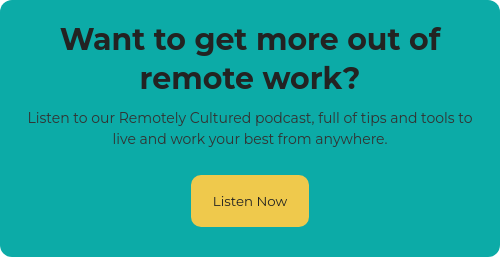What motivates you to do your best work — is it having more time? Having more money? Or is it something else? Do you understand what motivates you, and also what motivates the people who work with and for you?
Staying motivated to work for someone else — and to do great work — comes down to whether or not the work aligns with what motivates you personally. The best companies actively build a culture where employees are motivated to do their best work...whether that's because they like who they work for or with, they enjoy the freedom of time that the work offers, or they enjoy the lifestyle and cash that comes along with the work. Every employee is unique, and there will be different aspects of the job that motivate each.
I started First Page because I was motivated. Motivated to not have to work the way I had during my career in San Francisco with various technology companies. What drove me to put my foot down to motivation stagnation?
- 60-hour workweeks
- Traveling every month for work
- Many evening happy hours to entertain work clients, partners, or visitors
- An office job required to "cultivate relationships" at the company
- Passive-aggressive emails
- Exasperating leadership that was the crux of confusion, frustration, and complaining across teams
- A culture of mansplaining and young, egotistical male bravado being rewarded
- Lack of time and money to travel the way I wanted, despite having "unlimited vacation"
- Being called "aggressive" as a woman pushing back on the opinions of male colleagues
- Yearly reviews that were demoralizing, with critiques that were anonymous and hurtful
- Squeezing in dentist appointments and errands during my lunch hour
I began to look at how I could redefine work culture, so that people were motivated to do their best work but also have the time and freedom to live their best, balanced lives. I started to take everything that hindered my motivation at my previous job, and turn it into a work culture that flipped those antiquated ways of doing business on their head. I wanted the people I employed to exist in a culture that was motivating, not demotivating.
As a founder of a fully distributed company, I'm interested in what motivates those who work for me. I believe that if I can align my culture with what motivates each person, then they'll do their best work. If I can recruit people whose motivation is aligned with my culture, then they'll fit in, thrive, and stick around. When an employee is correctly motivated, both the founder of the company and the employee win. Want to know how?
Here's How We Keep Our Remote Employees Motivated
ASK WHAT MOTIVATES THEM
Sounds obvious, but a lot of companies just don't ask (which implies they don't care). A simple check in with employees to ask what motivates them is the key to understanding how to get the best work out of them. I ask each of my marketing experts what motivates them in either their interview or during our 1:1s, but I'm only managing a select group of leadership as the team grows. So, recently we started an "Employee Pulse" survey that is sent out two times a year.
In this survey, we ask, "What motivates you?" The dropdowns say "1. Time," "2. Money," or "3. Other," with the ability to fill in the "Other" with a custom answer. Many employees choose time or money, but some say success, learning more, working with people and projects they enjoy, doing work that aligns with their personal values, and a host of different responses. Now, I can understand what motivates each of the people who work with me, and how I might "reward" them to do even better work or to create loyalty with my company.
LEAD WITH EMPATHY AND KINDNESS
At First Page, I try first and foremost to lead with empathy and kindness, above all else. I find that everyone is motivated to work for someone they like. And some of the most demotivating jobs I've ever had were for horrible bosses who I didn't like. During each month's Zoom meeting check-in with remote teammates, I focus on connecting with my employees on what's happening with them outside of work before we talk about work.
It's important to remember that everyone you work with has a very big, wide life outside of what they do for work. They might have a side hustle, or a passion project, or charity work that they love. They might be having a hard time personally, or have tough family or personal situations that make it hard to get going each day. I'm constantly checking in on those who work for me. Not everyone wants to open up personally with colleagues or bosses, so this can be touchy to navigate until you figure each person out. But, overall, showing that you care and leading with kindness works a whole lot better than someone who is demanding and cares only about work and money.
SHOW APPRECIATION REGULARLY
I think it's really important to motivate your employees to do their best work by letting them know that what they do matters. It doesn't feel good when you KICK ASS and TAKE NAMES but that work is never appreciated or talked about. Some of the ways I try to show my employees that I appreciate all the hours and time and effort they spend on building my company and making our clients happy include:
- A personal, nice gift for Christmas delivered to their home
- A leather good of choice from Wanderers.co on their first work anniversary
- A $500 Airbnb gift card if they refer someone we hire for more than 30 hours a month
- A quarterly recognition gifting program for great work that gets done at our company
TRUST YOUR EMPLOYEES
I believe that people are motivated by being treated as autonomous, capable adults – not a ward of a company. We do not believe in a "butts in seats" monitoring culture like some companies have done during the new COVID work-from-home life. I trust everyone at First Page to work remotely, manage their time, and get their stuff done. We do not micromanage time or attendance.
Instead, we can tell if you're doing the work by the deliverables you're producing. When you choose the right employees, you soon find that they don't need to have their hands held. And if they do, or if they simply aren't delivering on expectations, it will become very clear, especially in a remote work environment. Those employees aren't the right fit, and it's best to find someone who is.
GIVE UNDERREPRESENTED GROUPS THE CHANCE TO THRIVE
It's very important to me to create a culture where the voices of women, black, Asian, LGBTQ, or any underrepresented group are heard and have an equal seat at the table. I want a company where many backgrounds, voices, and opinions come together to create the best, freshest perspective, and anyone, no matter their race or sexuality, feels welcome. I constantly review the diversity and inclusion at our company and am always working to diversify my team.
HIRE THE RIGHT PEOPLE WHO ALIGN WITH YOUR BRAND MOTIVATION
If you figure out what type of "motivation" you offer, then you can hire the right people who align with this motivation. Earlier, I talked about asking if employees are motivated by time or by money. I also mentioned that different people will choose one or the other, or some combination. I want First Page to be motivating to work for because you get the freedom of time to live the life you want outside of an office (or one location), but you also get paid the money you want and deserve.
I focus very deliberately on hiring the right people and those who have a shared interest: we all want to work remotely to have more "time freedom"; therefore, we're motivated to do our best work within our remote boundaries. If you're not someone who is motivated by time/freedom and remote work, you won't fit.
THINK ABOUT THE BEHAVIOR YOU'LL ACCEPT, GET RID OF THE REST
As mentioned above, a lot of the ways I was treated at a previous company was the exact opposite of motivating and kept me from doing my best work. It kept me up at night. Now, I sleep soundly, sure that I am working to change the narrative so my team knows how fiercely I guard our culture. At First Page, we simply do not allow:
- Passive-aggressive emails
- Any type of disrespectful behavior to any employee
- Babysitting and micromanagement
- Yearly review processes that require unnecessary negative feedback to "balance" positive feedback
- Referring to opinions or leadership traits as aggressive
- Hiring a leadership team that is white and male
BUILD A KICK-ASS CULTURE
Finally, I think people just want to work at places they like. So, I work hard to build a culture at First Page that motivates people to do their best work and stick around, simply because they like working here. We talk about a lot of this on our Remote Jobs culture page. Here are a few ways we keep a fun, engaging remote culture:
- I host a remote quarterly book club where I send copies of the book to all participants and then we discuss together over Zoom video (participation is optional).
- We do remote "Donut Dates" with team members where you connect on Zoom to talk about all things BUT work, and I send out donuts to participants twice a year.
- We leverage Slack A LOT — like many remote companies — to build our culture. Here are some of our non-work-related Slack channels:
- #bookclub: Discussions for our quarterly book club
- #dogs: Teammates post their dogs photos
- #shoutouts: A place to shoutout and praise team members who did something great
- #suggestion-box: A place to suggest changes/updates to our company, culture, or processes
- #firstpageteam: general team building discussions, article sharing, and jokes (like the “water cooler” of our team)
- #knowledge: A place to share channel-specific articles and updates
- #memes: You know what this is about
- #partyparrot: This is our celebration channel: new babies, anniversaries, birthdays, etc.
- #travel: Beautiful travel pics ensue!






